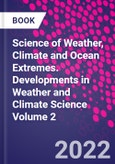Science of Weather, Climate and Ocean Extremes presents an evidence-based view of the most important ways in which the build-up of greenhouse gases in the atmosphere is affecting both our atmosphere and the oceans. The book provides compelling reasons why concerted action is required to slow the rate at which the atmosphere and oceans are changing. It not only covers longer-term changes in extremes and their causes, but also considers the drivers and attribution of extreme events, including relevant methods and techniques.
Members of the Royal Meteorological Society are eligible for a 35% discount on all Developments in Weather and Climate Science series titles. See the RMetS member dashboard for the discount code.
Please Note: This is an On Demand product, delivery may take up to 11 working days after payment has been received.
Table of Contents
1. Introduction
Part I: Changes
2. Changes in Characterising Extremes
3. Have Atmospheric Extremes Changed in the Past?
4. Have the Oceans Also Experienced Changes in Extreme Events?
5. 5 How are Atmospheric Extremes Likely to Change into the Future?
6. How are Marine Extremes Likely to Change into the Future?
Part II: Causes
7. Drivers of Past and Future Changes in Weather and Climate Extremes
8.� Attribution Methods Related to Past and Projected Changes, and to Extreme Events
9. Atmospheric Extremes: Attribution of Changes and Events
10. Marine Extremes: Attribution of Changes and Events
11. Reflections on Changes and Causes
Authors
John E. Hay Adjunct Professor, The University of the South Pacific; Adjunct Professor, Griffith University, Australia; Adjunct Professor, University of Auckland, New Zealand. Dr. Hay PhD, Has over fifty years' experience in academia, the private sector and governmental organisations. His work has focused on bringing an interdisciplinary approach to the environmental sciences and to technical and policy-relevant assessments and guidance, especially in relation to climate extremes, variability and change.He works as a consultant and advisor to many national governments and regional and international organizations, including several United Nations agencies, the World Bank, the Asian Development Bank, the Governments of New Zealand and Australia, the Pacific Regional Environment Programme, the Secretariat of the Pacific Community, and Live & Learn.
As a Lead Author for the Intergovernmental Panel on Climate Change (IPCC), John was a recipient of the Nobel Peace Prize, awarded jointly to the IPCC and Al Gore. John is also a recipient of a prestigious fellowship from the Guggenheim Foundation.








